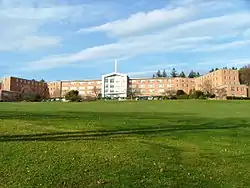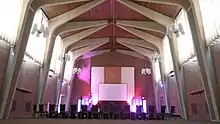Kripalu Center
The Kripalu Center for Yoga & Health is a nonprofit organization that operates a health and yoga retreat in Stockbridge, Massachusetts.[1][2] Its 160,000-square-foot (15,000 m2) facility is a former Jesuit novitiate and juniorate seminary built in 1957.[3]
 Kripalu Center for Yoga & Health | |
| Former names | Yoga Society of Pennsylvania |
|---|---|
| Location | Stockbridge, Massachusetts |
| Type | Retreat |
| Opened | 1983 |
| Website | |
| www | |
History
Founder Amrit Desai came from India in 1960 as a student at the Philadelphia College of Art and taught yoga in Philadelphia. In 1966, he co-founded the Yoga Society of Pennsylvania.[4] [5] In 1972, Desai set up a residential yoga center in Sumneytown, Pennsylvania.[5] In 1974, the organization's name was changed to "Kripalu Yoga Fellowship".[4] It taught Swami Kripalvananda's teachings, held retreats and other programs, and trained yoga teachers.[1][5] In 1975, Kripalu bought Summit Station, Pennsylvania, including a health center that became a key element of its mission.[5] In 1977, Swami Kripalu moved to the United States, inspiring many people to take up yoga. He returned to India in 1981.[1][5] The current Stockbridge, Massachusetts location, a former Jesuit seminary on a property called Shadowbrook, opened in December 1983.[5] During the 1980s, Kripalu grew to have over 350 residents. In 1994, it was discovered that Desai had had sexual relationships with female residents and resigned.[5] In 1999, Kripalu changed from a religious order to a secular non-profit organisation.[5][6][7]
As of 2008, Kripalu offered more than 750 programs and spiritual retreats attended by about 25,000 people annually.[8] Total annual visitation was reported to be about 30,000 people. Many workshops are conducted by outside presenters.[9] Kripalu Center also offers a semester-long program for young adults; projects in music, weight loss and post-traumatic stress disorder. Independent "Kripalu" instructors pay training and certification fees, in return obtaining liability insurance and other business and marketing support.[10]
The center employed about 626 people as of 2008 and could accommodate more than 650 overnight guests.[11] Kripalu hosted over 700 programs a year in its Schools of Yoga, Ayurveda, and Integrative Yoga Therapy;[5] its Institute of Extraordinary Living, founded by Kripalu's scholar-in-residence Stephen Cope;[12] and its conscious leadership program.[5] Kripalu Center's 2019 revenue was $37.24 million.[13]
In 2020, Kripalu closed due to the COVID-19 pandemic, reopening in 2021.[14]
Kripalu Yoga
Kripalu Yoga is a form of Hatha Yoga with elements of kundalini yoga that combines asanas, pranayama, and meditation.[1][15][16] Kripalu states that its teaching is "following the flow" of prana, or "life-force energy, compassionate self-acceptance, observing the activity of the mind without judgment, and taking what is learned into daily life."[17]
Facility
Kripalu's 100 acres (40 ha), include forests, lawns, gardens, and access to Lake Mahkeenac.[18][19] Conservation easements on 225 of the acres were granted in 1997 using a framework of the U.S. Forest Legacy Program.[20][21]

Kripalu's principal 160,000-square-foot (15,000 m2) building was constructed by the Jesuits in 1957 to replace the Gilded Age mansion "Shadowbrook Cottage." The Jesuits had planned to demolish the mansion due to high maintenance costs, but prior to demolition, the mansion was destroyed by a fire in 1956 which resulted in several fatalities. Jesuits had acquired the former estate in 1922 as a novitiate, but moved away in 1970.[22][23]
A $15 million, six-story housing annex with 80 guest rooms, was completed in 2010. Designed by architect Peter Rose, the annex incorporates sustainable design elements[24] and won a 2010 award for specialized housing from the American Institute of Architects. The institute commented on the building's interior natural lighting, and noted that the architectural design and climate control systems are integrated and consume 40 percent less energy than a conventional building.[25] Rose also developed a master plan for increasing the center's capacity and developing it into "a model of environmental responsibility" through improvements to existing buildings, landscaping, and new construction.[26]
Kripalu Center for Yoga & Health formerly operated its own water supply. Groundwater from onsite wells was used for its water supply source, supplemented by water purchased from the Lenox water department.[27] There were regulatory agency "concerns" resulting in at least two enforcement actions about the water supply's potential vulnerability to contamination,[27][28][29] and as of 2009 the center's water supply had been converted to rely solely on purchased water obtained from surface water sources.[30]
References
- Leviton, Richard (March–April 1990). "Yoga in America: The First 100 Years". Yoga Journal (91): 123–124.
- Although the Kripalu Center is in the town of Stockbridge and uses a Stockbridge address, it is sometimes described as being in the nearby town of Lenox; for example, by the Boston Globe (Bess Hochstein, If you go: Kripalu Center, Lenox, Mass., July 18, 2004) and in Arthur Frommer's 2009 book Ask Arthur Frommer: And Travel Better, Cheaper, Smarter (page 137).
- "Kripalu: Physical and spiritual wellness". Archived from the original on 2016-12-20. Retrieved 2019-04-16.
{{cite journal}}: Cite journal requires|journal=(help) - Jones, Constance A.; Ryan, James D. (2007). "Desai, Guru Amrit". Encyclopedia of Hinduism. Encyclopedia of World Religions. J. Gordon Melton, Series Editor. New York: Facts On File. pp. 124–125. ISBN 978-0-8160-5458-9. Archived from the original on 2020-04-02.
- "Our History". Kripalu Center for Yoga & Health. Retrieved 30 April 2019.
- Black, Jane (3 Sep 2010). "Kripalu updates its look but not its values". The Washington Post. Retrieved 17 July 2013.
- "FAMOUS YOGI RESIGNS, ADMITS HE HAD SEX WITH 3 FEMALE FOLLOWERS". Pqasb.pqarchiver.com. 1994-11-03. Retrieved 2010-01-08.
- "About Kripalu". Kripalu.org. Archived from the original on 2008-09-19. Retrieved 2009-09-20.
- Andy Newman, It’s Not Easy Picking a Path to Enlightenment, The New York Times, July 3, 2008
- "KAS Information Packet" (PDF). Retrieved 2010-02-23.
- ProPublica, Mike Tigas, Sisi Wei, Ken Schwencke, Alec Glassford (9 May 2013). "Kripalu Center For Yoga & Health Inc - Nonprofit Explorer". ProPublica. Retrieved Oct 23, 2019.
{{cite web}}: CS1 maint: multiple names: authors list (link) - "Stephen Cope | Scholar-In-Residence and Kripalu Ambassado". Kripalu. Retrieved 7 May 2019.
- "Kripalu Center for Yoga and Health Inc".
- "Kripalu to begin to staff up toward August reopening".
- Jones, Constance A.; Ryan, James D. (2007). "Kripalu Yoga". Encyclopedia of Hinduism. Encyclopedia of World Religions. J. Gordon Melton, Series Editor. New York: Facts On File. p. 237. ISBN 978-0-8160-5458-9. Archived from the original on 2020-04-02.
- Pizer, Ann (6 January 2019). "The Essentials of Kripalu Yoga". Very Well Fit. Retrieved 30 April 2019.
- "The Kripalu Approach: Yoga for Everybody". Yoga Therapy Ireland magazine. Autumn 2006.
- Jay Paris and Carmi Zona-Paris (2006), 100 Best All-inclusive Resorts Of The World. Globe Pequot, ISBN 0-7627-3860-X, ISBN 978-0-7627-3860-1. Pages 4-5.
- http://www.thesba.org/about-us/interesting-facts-about-stockbridge-bowl Archived 2013-07-28 at the Wayback Machine, Stockbridge Bowl Association website, accessed July 15, 2010
- "Forest Legacy Needs Assessment for Massachusetts" (PDF). Retrieved 2009-09-20.
- "Fiscal Year 2000 Annual Report" (PDF). Massachusetts Department of Environmental Management Land Acquisition and Protection Program.
- Shea, Francis; Appleyard, Joseph (Jan 1, 2009). "The Shadowbrook Fire". New England Province History. Retrieved Oct 23, 2019.
- "Earthsong Yoga". Earth Song Yoga. 2015.
- Robert Campbell (2010-05-09). "New dorm at Kripalu center radiates sustainability and simplicity". The Boston Globe. Retrieved 2010-06-29.
- 2010 AIA Housing Award Recipient, Category 4: Specialized Housing: The Housing Tower, AIA website, accessed August 1, 2010
- 2010 National Award for Specialized Housing, DesignSpotter, accessed August 1, 2010
- "Report For Kripalu Center for Yoga & Health" (PDF). Massachusetts Department of Environmental Protection Source Water Assessment and Protection (SWAP).
- "MassDEP: 2007 Enforcement Actions". Massachusetts Department of Environmental Protection. 2007-12-21. Retrieved 2009-09-20.
- "MassDEP: 2006 Enforcement Actions". Massachusetts Department of Environmental Protection. 2006-11-22. Retrieved 2009-09-20.
- "Public Water System (PWS) Name, Public Water System Number, Principal City Served System, Population Served, % of city/town served by PWS, Primary Water Source" (PDF). Archived from the original (PDF) on December 25, 2010. Retrieved February 11, 2010.
